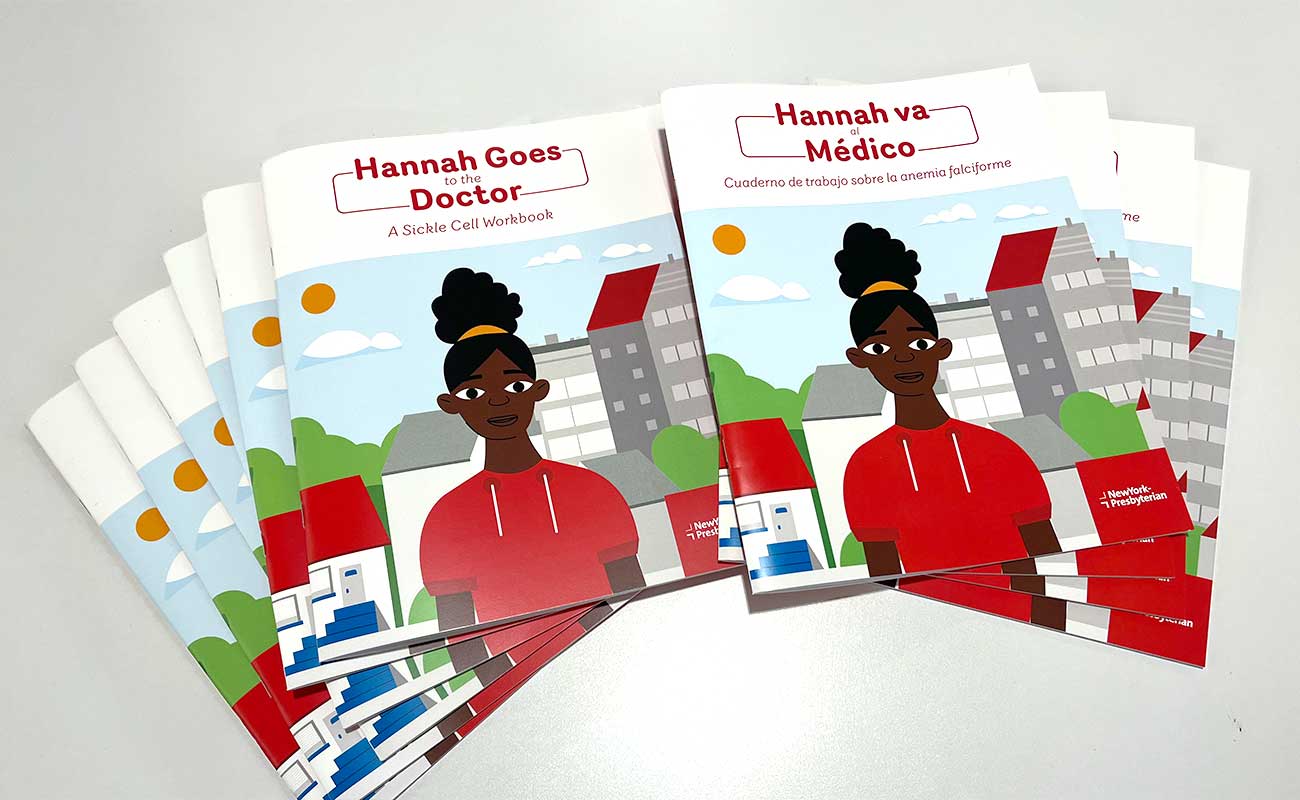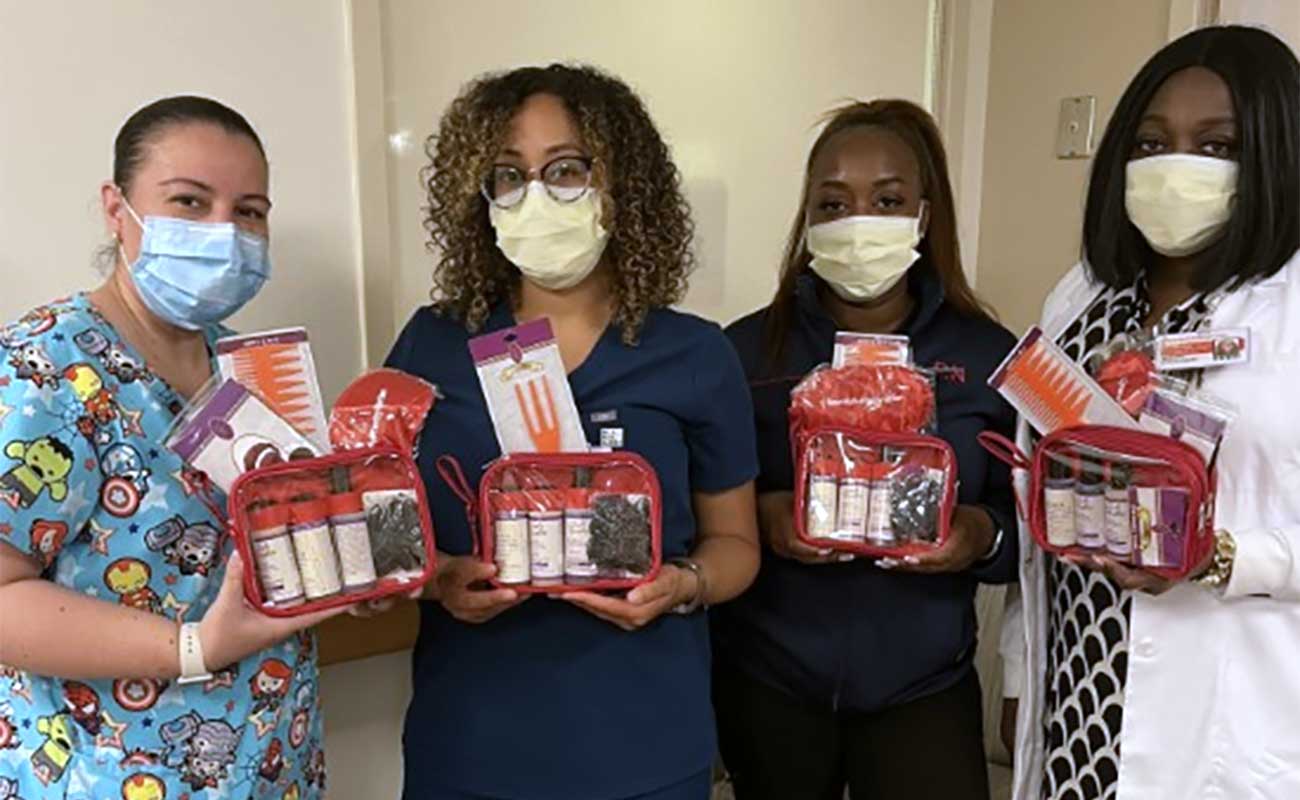Developing and expanding several institutional projects designed to identify and address disparities.
Sickle cell disease is a genetic blood disorder that affects approximately 100,000 Americans (~10,000 New York State residents), predominantly Black and Latino Americans. Although there have been significant milestones achieved in the last 5 years, research continues to be underfunded in comparison to similar genetic disorders, and mortality has not significantly improved in the last 40 years. The Dalio Center has chosen to focus on this chronic disease to improve patient experience and access to care, provide resources to patients, families, and providers, and create innovative programs to allow for highest quality of care for this patient population.
NewYork-Presbyterian is a leader in sickle cell disease care, delivering care to over 1,100 patients annually and providing innovative therapies like stem cell transplantation and gene therapy. Our new system-wide program expands on this innovative, compassionate, patient-centered care by focusing on three main areas: clinical care optimization, transition from pediatric to adult care, and education and resources. In 2024, we aim to publish a sickle cell program report and launch a national awareness campaign.

1 Many children with sickle cell anemia not receiving lifesaving screening and treatment. Centers for Disease Control and Prevention. September 20, 2022. Accessed December 7, 2023. https://www.cdc.gov/media/releases/2022/s0920-vs-sickle-cell-anemia.html.
Over
1.1k
sickle cell patients cared for annually
131
patients followed by transition coordinators
NewYork-Presbyterian is developing plans for an innovative Early Childhood and Family Hub in Washington Heights. This comprehensive community center will leverage community, city, and state resources to foster early childhood development, setting children onto lifelong trajectories of health and well-being. NewYork-Presbyterian has a longstanding relationship with the Washington Heights community, and is dedicated to addressing the social needs faced by many families in the area such as poverty, overcrowding, food insecurity, and a general lack of accessible resources for families with young children.
The Dalio Center, the Division of Community and Population Health, Columbia University Irving Medical Center’s Department of Pediatrics, Northern Manhattan Early Childhood Collaborative, and other local partners, are developing a community-informed plan for an Early Childhood and Family Hub which will integrate elements of family support, education, age-appropriate play, and access to a diverse range of social benefits and resources. In creating the Early Childhood and Family Hub, we hope to meet the unique needs of families in the Northern Manhattan community.
Together, we are committed to funding, developing, and operating this vital resource that will positively impact the lives of children and their families in the community.

Disparities in kidney disease are well documented: End Stage Kidney Disease (ESKD) disproportionately affects those with low socioeconomic status, Black race, Hispanic ethnicity, and housing insecurity. The Dalio Center has grant funded the Rogosin Institute to expand the Prevention and Education in Advanced Kidney Disease (PEAK), expanding the program from NewYork-Presbyterian/Weill Cornell to the NewYork-Presbyterian/Columbia and Allen Hospital. The program includes support for a collaborative, bilingual team of physicians, nurse educators, social workers, dietitians, and peer mentors, as well as analytic support to track the impact of our program.
One of the program’s fundamental principles is that family and caregivers are an essential part of the care team. By actively engaging patients and their family/caregivers, the program facilitates pre-emptive kidney transplants (i.e., by facilitating discussion with potential donors) and provides viable support systems for patients choosing home modalities. The program has been remarkably successful, surpassing national and local averages in multiple categories: pre-emptive transplant rates, home dialysis rates, peripheral vascular access placement, and the start of dialysis without an in-patient admission.
In 2024, PEAK plans to facilitate a chronic kidney disease (CKD) wellness day and invite wellness ambassadors, patients, and PEAK program graduates. PEAK aims to provide continuous education in the detection and diagnosis of kidney disease and improve awareness of different modalities.
187
patients enrolled in the PEAK program
5
patients transplanted in the PEAK program
The Early Childhood and Family Hub will center families and meet them where they are—for health education, early childhood play, nutrition support and community. Nido de Esperanza is so excited to be a part of it.
Holly Fogle
Executive Director of Nido de Esperanza
The Dalio Center’s invaluable support for the PEAK program has been pivotal, significantly enhancing access to vital education on chronic kidney disease, home dialysis, and transplant education for underrepresented patients, profoundly impacting their lives.
Sean Kalloo, MD, MBA, FASDIN
Medical Director of PEAK Program
Associate Professor of Medicine (in Radiology), Columbia University Irving Medical Center
3k
products donated by Carol’s Daughter
From October 2021 to December 2021, we completed a successful pilot of offering hair care kits for patients with curly, coily, and tightly textured hair, at NewYork-Presbyterian/Weill Cornell Medical Center in pediatrics. The program was then expanded to NewYork-Presbyterian Brooklyn Methodist Hospital in the winter of 2022. The Dalio Center has since built a relationship with Carol’s Daughter, a Black-led, woman-led hair care product company under the parent company L’Oreal. Through this relationship, we offer our maternal and pediatric patients hair kits that include Carol’s Daughter shampoo, conditioner, and leave in-conditioner, and other accessories. NewYork-Presbyterian participated in community events hosted by Carol’s Daughter and Carol’s Daughter has donated close to 3,000 products to our patients and community members. In 2023, a manuscript about the program was published in the New England Journal of Medicine Catalyst and the program was featured on 21Ninety.

In 2023, the Dalio Center supported the Trust for Public Land’s New York City Community Schoolyards Program. Since its inception, this program has transformed 227 asphalt schoolyards into bustling, green spaces with gardens, play structures, athletic facilities, outdoor classrooms, and more. The Dalio Center is supporting two community schoolyard projects that Trust for Public Land has designed with the community. These schoolyards are located in Jackson Heights, Queens and Bedford-Stuyvesant, Brooklyn—two priority neighborhoods identified by NewYork-Presbyterian’s Community Health Needs Assessment.

Supporting
2
community schoolyard projects
The Hospital Consumer Assessment of Healthcare Providers and Systems (HCAHPS) survey is a national, standardized, publicly reported survey of patients’ perspectives of hospital care. Findings from 2023 HCAHPS data disaggregated by patient preferred language showed disparities among our Chinese-speaking patients.
From the observed lower HCAHPS scores among Chinese-speaking patients and based on feedback from our patients, NewYork-Presbyterian is taking the following steps to improve the patient experience for our Chinese-speaking patients and understand ways to enhance the patient experience for better health outcomes:
NewYork-Presbyterian will continue to monitor, consider patient feedback, and take steps to improve our patient experience. By taking these steps to improve patient experience, we hope to achieve better health outcomes for the communities we serve.
The Dalio Center frequently collaborates with NewYork-Presbyterian’s Division of Community and Population Health (DCPH) on new projects focused on improving quality and access to our care. The goal of these programs is not only to connect residents of our communities with high quality health care, but also to encourage them to become advocates for their own health and their family members’ health. Together, these initiatives help meet NewYork-Presbyterian’s commitment to improving health outcomes and increasing access for community members in a manner that underscores collaboration and community involvement.
Despite prevention efforts, racial and ethnic disparities in prevention, diagnosis, and treatment of HIV, viral hepatitis, and sexually transmitted diseases continue to exist. Launched in fall 2023, the NewYork-Presbyterian MMU supports targeted outreach to specific communities as part of NewYork-Presbyterian’s HIV and Hepatitis-C elimination strategy and brings Prep-Pep health education materials, health kits (e.g. condoms, hygiene supplies, etc.), and most importantly, an entry point to health and social services to the communities we serve.
To improve health outcomes in individuals released from incarceration, the Center for Hope and Resilience provides comprehensive health care services, including internal medicine/primary care, mental health services, social work, substance use treatment, Obstetrics & Gynecology healthcare, and connection to other care. The center also employs a ‘Credible Messenger’ model to conduct outreach and provide patient navigation.
The Dalio Center partners with the DCPH to support work in the Ambulatory Care Network to align practices and metrics across payors and settings, with a focus on equity. To support this work, the Dalio Center maintains an Ambulatory Care Equity Dashboard, which includes several key ambulatory measures disaggregated by payor, race/ethnicity, and preferred language.
In 2022, the Dalio Center partnered with the DCPH’s Center for Community Health Navigation to expand SDoH screening in the emergency department setting. In 2023, the Dalio Center continued to fund a team of navigators with specialized training in social referrals and navigation.